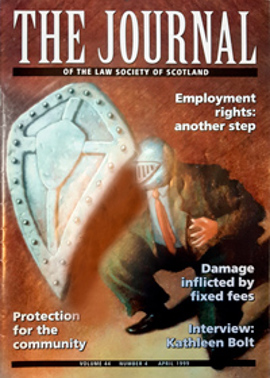Standard securities and EU law - an oxymoron?
The heading is not a mistake, but many conveyancers might think that EC law does not impinge on the law on standard securities. The title is slightly mischievous in that the case which is under discussion is Citibank International plc v Kessler (The Times, 24 March 1999), a decision of the Court of Appeal in England. However, as the facts will show, the issue could just as easily have arisen in Scotland.
Mr & Mrs K were German nationals who had a loan from Citibank which was secured over their house in Berkshire. There was a condition in the mortgage that the property could not be let by the debtors without the consent of the lenders. A similar condition appears in Standard Condition 6 in the 1970 Act. Mr K returned to Germany in 1991 and fell into arrears with the mortgage. The house had structural defects and as a result was unsaleable, but Citibank refused to allow them to let the property. Because of this Mr K could not afford to remain in Germany and had to refuse work there.
In defence to Citibank’s attempt to call up the security the Ks founded on Article 48 of the EC Treaty which guarantees free movement of workers within the EC. Their argument was that there was an implied term of the mortgage that the lenders would not unreasonably withhold consent to letting and that Article 48 prevailed over the mortgage. This Article had been considered in two cases, the most recent of which was Bosman ([1995] ECR 1-492), and European Court’s view was that the Article was aimed at regulating gainful employment in a collective manner.
The Court of Appeal in the present case held that the mortgage condition did not infringe Article 48 because the mortgage conditions were not aimed at regulating employment, and were not part of a collective arrangement. The mortgage condition was intended to protect Citibank’s interests and while that was a problem for the defendants, these were not covered by Article 48. The fact that Citibank were willing to lend to the Ks to enable Mr K to take up employment here facilitated his freedom of movement, but if the argument put forward by the defendants succeeded, there would be a risk that banks would be unwilling to lend to those who might move between Member States. The Court also had some difficulty in accepting that events subsequent to the mortgage could be used to imply a term into that mortgage.
In this issue
- Acronyms that speak louder than words
- Competition Act comes of age
- Act taps into every conscience
- Reshaping the criminal justice system
- Redundancy fears over fixed fees
- Another step in process of change
- Much tinkering, little change
- Interview: Kathleen Bolt
- You, EU and e-commerce too
- "Reasonable grounds" in search for drugs
- Civil law update of recent decisions
- Protecting designations of origin
- Standard securities and EU law - an oxymoron?
- Targeting high risk areas






